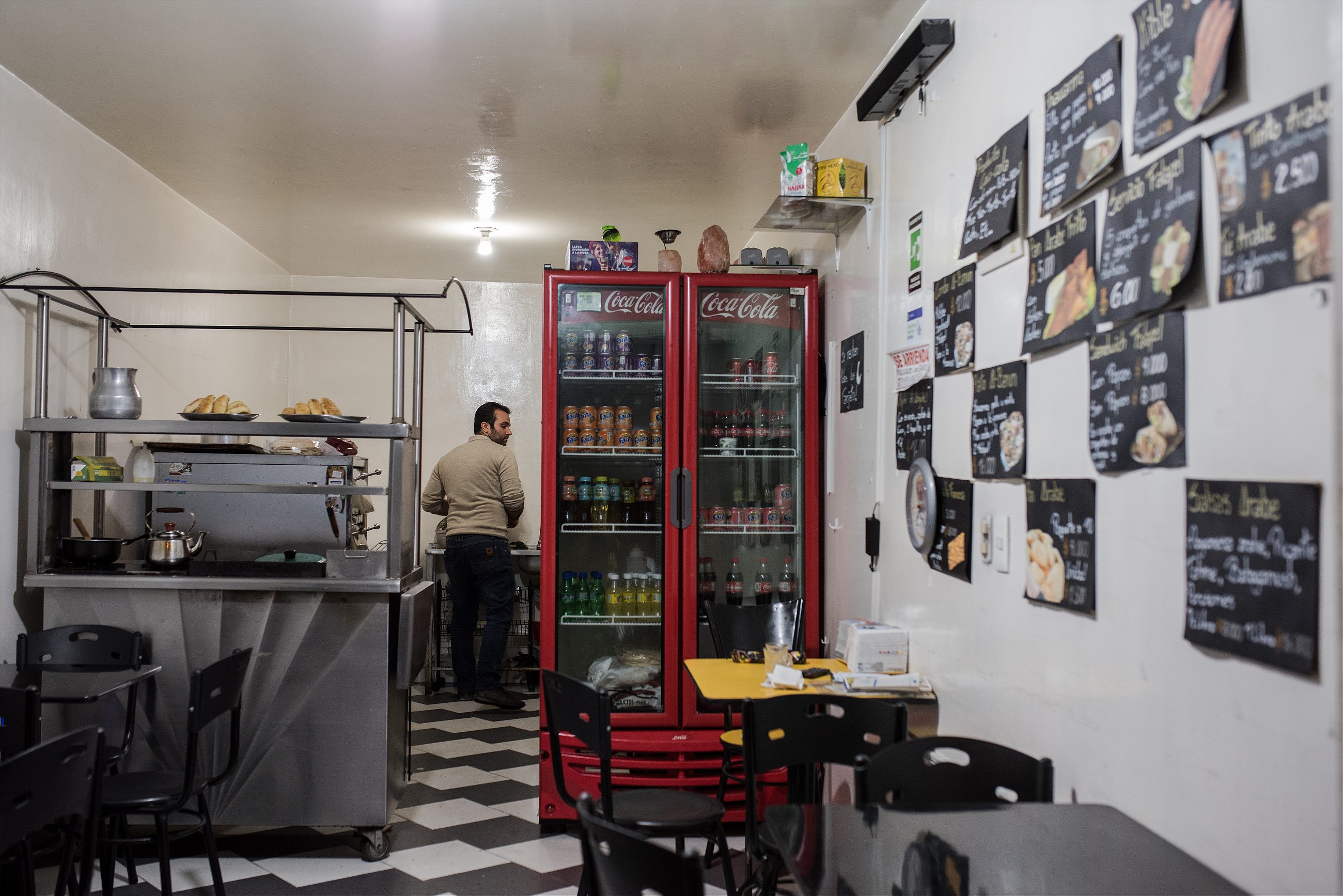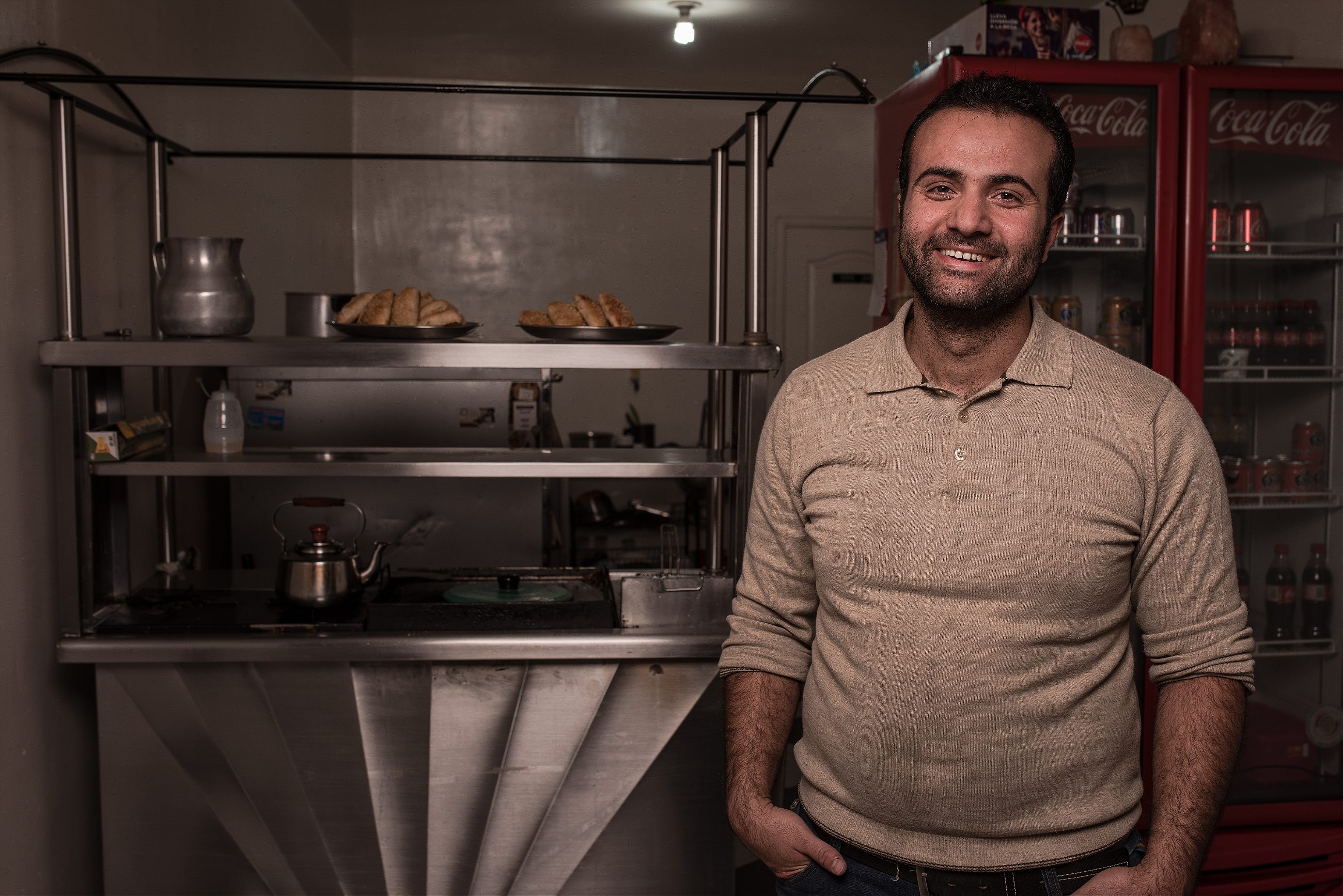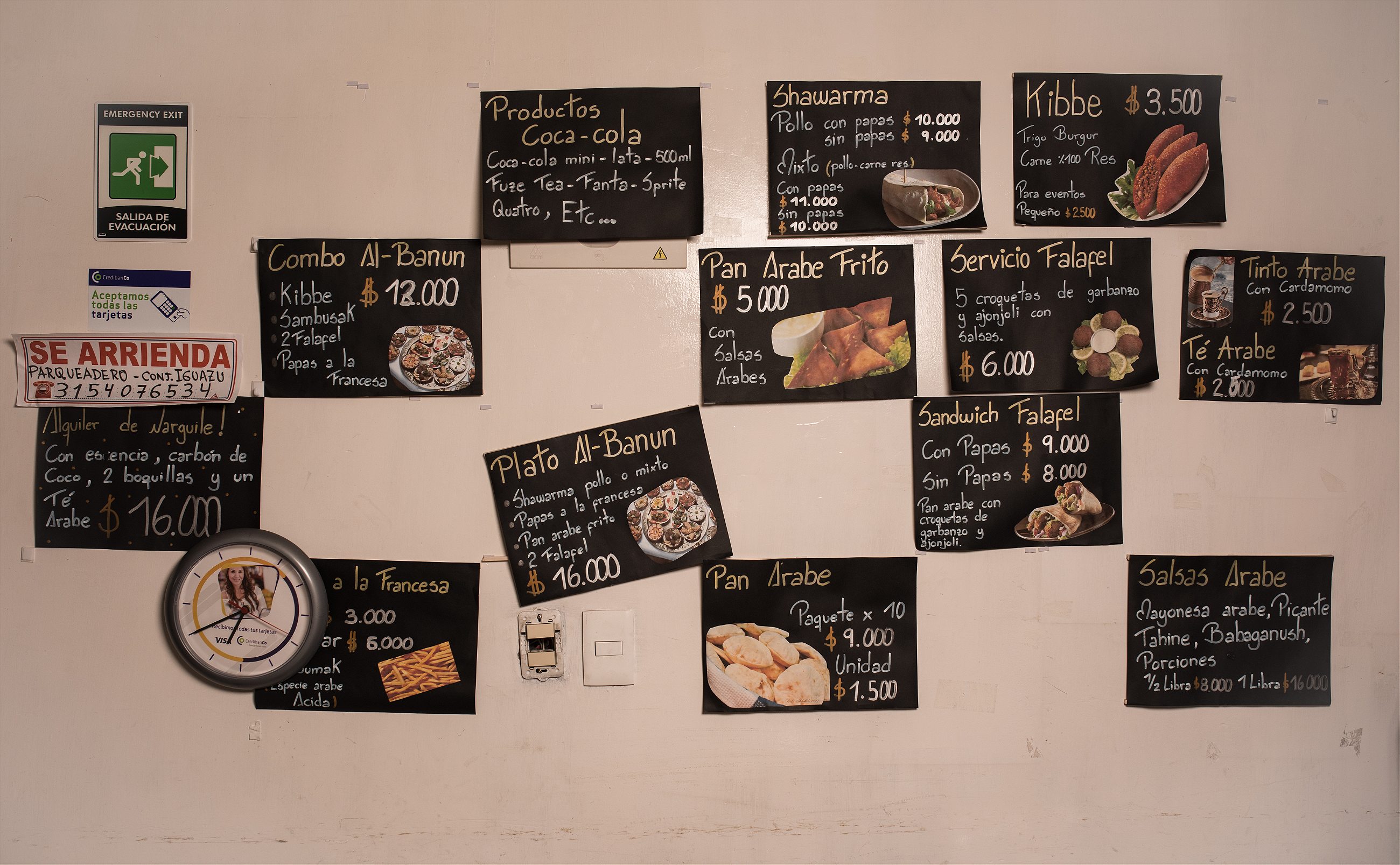The unlikely journey of one man from Syria to Bogotá.
Almotaz Khedrou is one of only six Syrian refugees living in Colombia. This is not an obvious destination for people trying to flee war; Colombia has waged its own internal armed conflict for decades. And though that conflict was mostly concentrated in a few rural areas, it has gone for so long that, according to which source you consult, Colombia has either the most or the second most internally displaced people of any nation, with about six million. The other country vying to top that list? Syria, of course.
But Almotaz ended up in El Pinar, a quiet and peaceful middle-class neighborhood in the northwest Suba area of Bogotá. Among the newly built roads and recently erected buildings, he opened a Syrian restaurant that is attracting people from all over the city. It is a small space, with five tables and a limited menu, and its original Syrian dishes have become legendary through the word-of-mouth of happy customers that have found there a tastier alternative to the Colombianized cuisine of most other Middle Eastern restaurants in the city.
When I meet Almotaz in his restaurant, he is tending to a table presided over by an American woman who works in a university and a few American diplomats visiting the city. The restaurant is a recently converted storefront with no kitchen; for now, everything is cooked on a food cart grill. This means the menu is limited: shawarma, grilled meats, and falafel are served alongside bite-sized delicacies like kibbes and tabbouleh salad.
He runs back and forth through the restaurant, cooking for the Americans and for me and my girlfriend, greeting his neighborhood friends, buying supplies from vendors, explaining his recipes, chatting with patrons, making sure everyone is at ease, all the while shifting seamlessly between English to Spanish.

When the Americans leave, Amotaz pours us Arabic-style tea and coffee. After briefly excusing himself to pray in the kitchen, he tells me his story in Bogotano-accented Spanish.
In 2012, when the Syrian civil war began to worsen, the government of Bashar al-Assad banned all men between the ages of 18 and 42 from leaving the country in an attempt to replenish their troops. The Syrian army conscription age is 18, but it was in 2013, when Almotaz was 23, that the army started calling for him. Almotaz was living in Damascus and studying economics, but he faced a stark choice: “I could stay in Syria and be forced to join the army and kill other Syrians, or I could try to escape.”
Escaping was not an easy choice; the al-Assad government would forever see him as a traitor, and he realized he could probably never return to Syria. It also meant spending money his family couldn’t afford to the pay the Syrian Army to help them sneak across the border. But he couldn’t stand the idea of staying and fighting. So, the next year, his father sold a car, and Almotaz used the money to be smuggled over the Lebanese border, leaving his parents and four siblings behind.
Since the Syrian civil war started in 2011, five million of Almotaz’s compatriots have left the country. Most have gone to Turkey, Lebanon, Jordan or Germany, all countries known for accepting Syrian refugees. But Almotaz had a different destination and a different motivation: he was in love.
In 2011, he had met Jessica, a Colombian, online. Amotaz’s father, who owned a supermarket in Damascus, knew a Greek-Colombian merchant named Dimitri. He told Almotaz’s father that he knew a nice family in Colombia, and that he was going to put them in contact because their children, like Almotaz, spoke English, and maybe they could speak to each other and visit each other’s countries. Jessica and Almotaz started talking online, and eventually they met in Turkey, where Jessica spent a year studying.
“I knew instantly she was unlike other girls,” Almotaz says. “She’s always thinking how to make her country better.“ She felt strongly about Almotaz, as he did about her. As a devout Muslim, he didn’t want to date casually; he wanted a serious commitment right away. Jessica agreed, and they started planning their life together: they would get married and Jessica would go to Syria—back then, it seemed like the war wouldn’t last long—where she could study for free and live a good life.

But then the war changed everything. Bullets periodically hit Almotaz’s house, and the army kept calling, “inviting” him to join. When a bomb hit his father’s supermarket, he finally decided to leave. When he reached Lebanon, Almotaz tried to get a Colombian tourist visa to reunite with his fiancée in Bogotá, where she was studying philosophy, but it was denied. Not certain of what to do, he moved to Istanbul, where he knew other Syrians and thought he could get a job and save money.
He barely scratched by there. He worked every job but often he was not paid. He had no papers, so how could he complain? He was miserable, and everyday he longed to be with his bride. Jessica wanted to go to Turkey and marry Almotaz there so he could apply for a Colombian visa, but she couldn’t find the money to make the trip. So they decided to get married online.
In Colombia, you can sign a document, called a poder, which grants someone else legal authority to sign any document for you, even a marriage contract. Almotaz authorized his soon-to-be mother-in-law, who went with Jessica to find a public notary in Bogotá to marry them. Almotaz followed the proceedings from the other side of the world on his small phone’s screen, and from there he said “I do.”
But this wasn’t enough for Colombian law. To get the visa, Jessica had to be in Turkey with him. Jessica, desperate, contacted the only mosque in Bogotá asking for help. One of the members of that mosque, a Colombian lawyer, was in charge of that email account. He received Jessica’s message and promptly replied that he was in Istanbul vacationing, and that he would meet her fiancé there. “God is great,” Almotaz says. “Finally, it seemed like my dream of being with my love might become true.”
Jessica arranged a meeting without realizing a huge obstacle: the Colombian lawyer spoke no English and Almotaz spoke no Spanish. But as he met the lawyer in front of a mosque, he caught another lucky break: a Palestinian man who had lived in Mexico and happened to pass by overheard them struggling and offered to translate.
He started selling empanadas outside of the mosque but was told to move
The Colombian lawyer had a simple message to relate: Get three thousand dollars and buy a ticket to Ecuador. Get a thousand dollars for pocket money and cross the border to Colombia. When you are there, you can apply for a refugee status.
“When I heard that, I felt ill,” says Almotaz. “Where was I going to get four thousand dollars working as a refugee in a foreign country? I was lost and defeated.” But he remembered another Syrian in Istanbul, Abu Faref, who, Almotaz says, “is a good Muslim and has a big heart.” Almotaz told him his story, seeking advice. Abu Faref gave him much more than that. He told him he would buy him the plane ticket to Ecuador, on the condition that he became an exemplary Muslim: he had to work hard, he had to be a good family man, he had to be a good host, he had to be devout, and he had to show the people of Colombia the beauty of their faith.
In 2014, Almotaz flew to the UAE, then to Brazil, and finally, after eight months of travelling, he landed in Ecuador in August. There he met Jessica again. “It was an overwhelming feeling, the greatest feeling,” he says. They both got a bus to Ipiales, on the Colombian side of the border. They passed through five border controls, but no one stopped him. He figured that if he kept his mouth shut, people would assume he was Colombian. When it was Jessica’s turn to show her papers, he moved behind a guard, and they forgot about him. A few minutes later, they were in Colombia.
A Catholic NGO, Pastoral Social, helped Almotaz get a refugee status with UNHCR (the UN High Commissioner for Refugees). But now he was lost again. He didn’t have money, he didn’t speak Spanish, and he had no valid academic or professional title here, so he couldn’t work or study. He started going to the mosque where the Colombian lawyer who met him in Istanbul worked, but he found no help.
He started selling empanadas outside of the mosque but was told to move. He started working for Middle Eastern restaurants around Bogotá and its suburbs, but the work was sporadic and usually underpaid.
That was when Almotaz’s mother told him he should start selling Syrian food. Almotaz didn’t know how to cook, but his mom started to teach him via Skype every night, if the fighting had not cut electricity in Damascus. Almotaz started making Syrian-style pitas, which he sold to a local Mexican restaurant and a few other neighbors. But as he learned more recipes, and knew more people in the area, he thought he could expand. He asked Pastoral Social for help and they gave him some money to buy a food cart with a grill. Every midnight in Colombia—when it was morning in Syria—Almotaz and his mother would talk through her recipes.
With Jessica’s help, he started selling Syrian street food—falafel, kibbeh, sambusak—in a nearby park. The locals loved it and soon it seemed like everybody wanted to try it and learn about the man behind the cart. Who was this Syrian refugee in Colombia, and how on Earth had he ended up selling street food in an unheard of corner of Bogotá?
He started to learn Spanish by talking with his customers. The urgency of learning the language accelerated when Jessica became pregnant with their first child. When she was about five months pregnant, she couldn’t help him with the cart anymore, so he had to communicate on his own.
Throughout his life in Colombia, he had kept his promise to Abu Faref: he worked hard, he treated people right, and he prayed five times a day. Jessica also decided to convert to Islam. “I am very happy about this,” says Almotaz. “I was sure God would help us find a way forward. That was what my mom had told me: ‘keep praying and God will provide.’”
One day, a small drugstore in the neighborhood shut down and the space became available to rent. Almotaz had no money to rent it, but Pastoral Social told him they would give him the money for the first month’s rent. The same month that he and Jessica opened the restaurant, their first son, Gabriel Adam, was born. Almotaz decided then to name the restaurant “Al-Banún” a Spanish rendering of part of an Arabic phrase which means “children come blessed.”

But the journey is not over. Almotaz’s family is still stranded in Syria. Only his brother Mouatasem was able to flee to Germany. His younger brother Abdullah has spent the last year hiding in his parents’ house. He recently turned 22, and the Syrian Army is looking for him, just like they were looking for Almotaz four years ago.
Colombia won’t grant refugee status to people abroad; Almotaz’s family must reach the country to be considered for asylum. The only option is to save for a trip like the one Almotaz made to enter Colombia. But with little work available in war-torn Syria, and an expensive business to run in Bogotá, Almotaz and his family have found it hard to get the money.
If his family does manage to get to Colombia, however, Almotaz has big plans. He’d get a big house, decorate it in the Syrian style, and open a nice restaurant there. His mom would cook and blow every Colombian away. And if Syria becomes peaceful again one day, he would go back from time to time to start a Colombian food business there. “People would love arepas,” he says.
But for now, Almotaz sees Bogotá as home. He plans to raise his boy here as a good Muslim. Almotaz speaks Arabic with him so he won’t forget his roots. Still, he doesn’t go to the mosque in Bogotá because he doesn’t feel welcome, and he almost never speaks to the other Syrians in Colombia. His life is his family—Jessica and Gabriel, but also his family in Syria—and his restaurant. He stopped following the news in Syria because he couldn’t take it anymore. It drained his energy and distracted him from his work.
His focus now is on bringing his family to Colombia; one supporter has set up a GoFundMe campaign for the family. Though he is happy to have been welcomed by his neighbors and by his patrons from all over Bogotá, he still wishes there was more that could be done for his family. For now, however, he keeps cooking and he keeps telling his story to whoever is willing to listen.